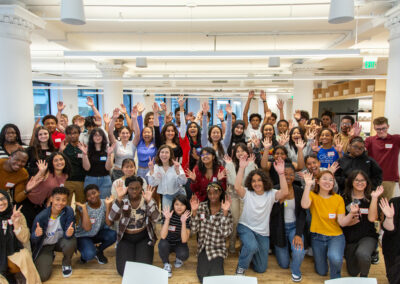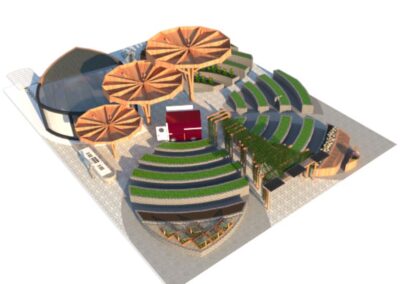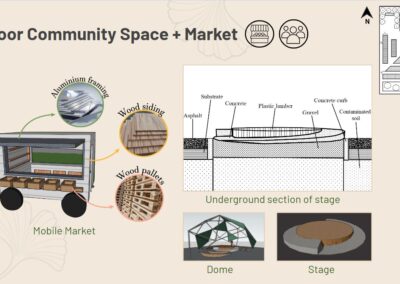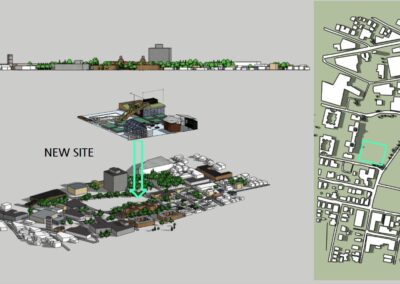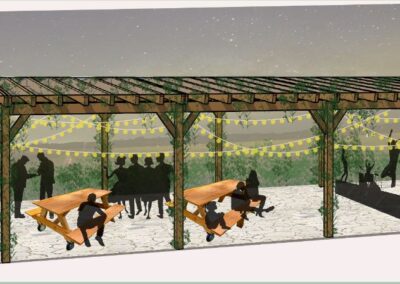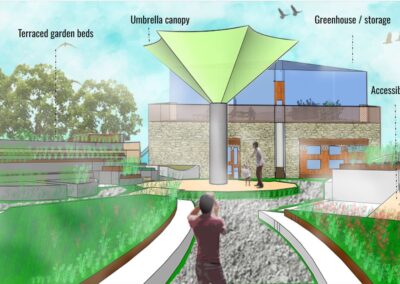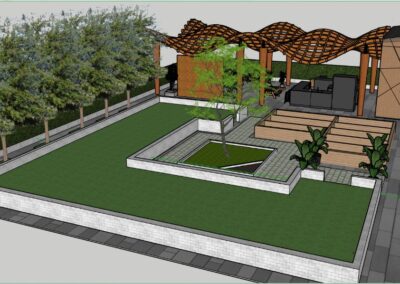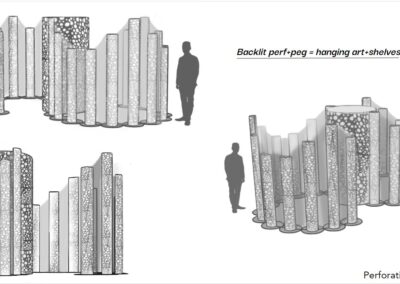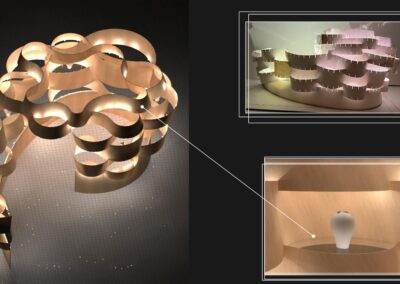August 30, 2023
SEED students design urban garden and artist kiosk
Estefany Benitez
This summer, the Sasaki Foundation hosted our sixth annual Summer Exploratory Experience in Design (SEED) program. For six weeks, we hosted 43 high school students representing 10 Boston neighborhoods and six Greater Boston communities. Students spent their summer learning, growing, and creating concepts for Groundwork Somerville’s New Urban farm and the kiosk that will be used by artists at 10 World Trade.
SEED 1, an introductory experience to design, allowed the SEED interns to analyze two of the proposed sites for Groundwork Somerville’s New Urban Farm. Groundwork Somerville is strongly committed to youth development, so this project was perfectly aligned with their mission to empower youth. In six smaller teams, SEED interns conducted an in-depth environmental, social, and cultural analysis of the sites to determine what activities and structures the organization could implement. With the help of their design mentors, each team took into consideration the site uses, materials to incorporate, and the structures to install, so that their respective sites would reach their highest potential. With newly acquired design program skills, students were able to create visual renderings of their site plans, which allowed them to clearly visualize how their sites would look and how they would be used.
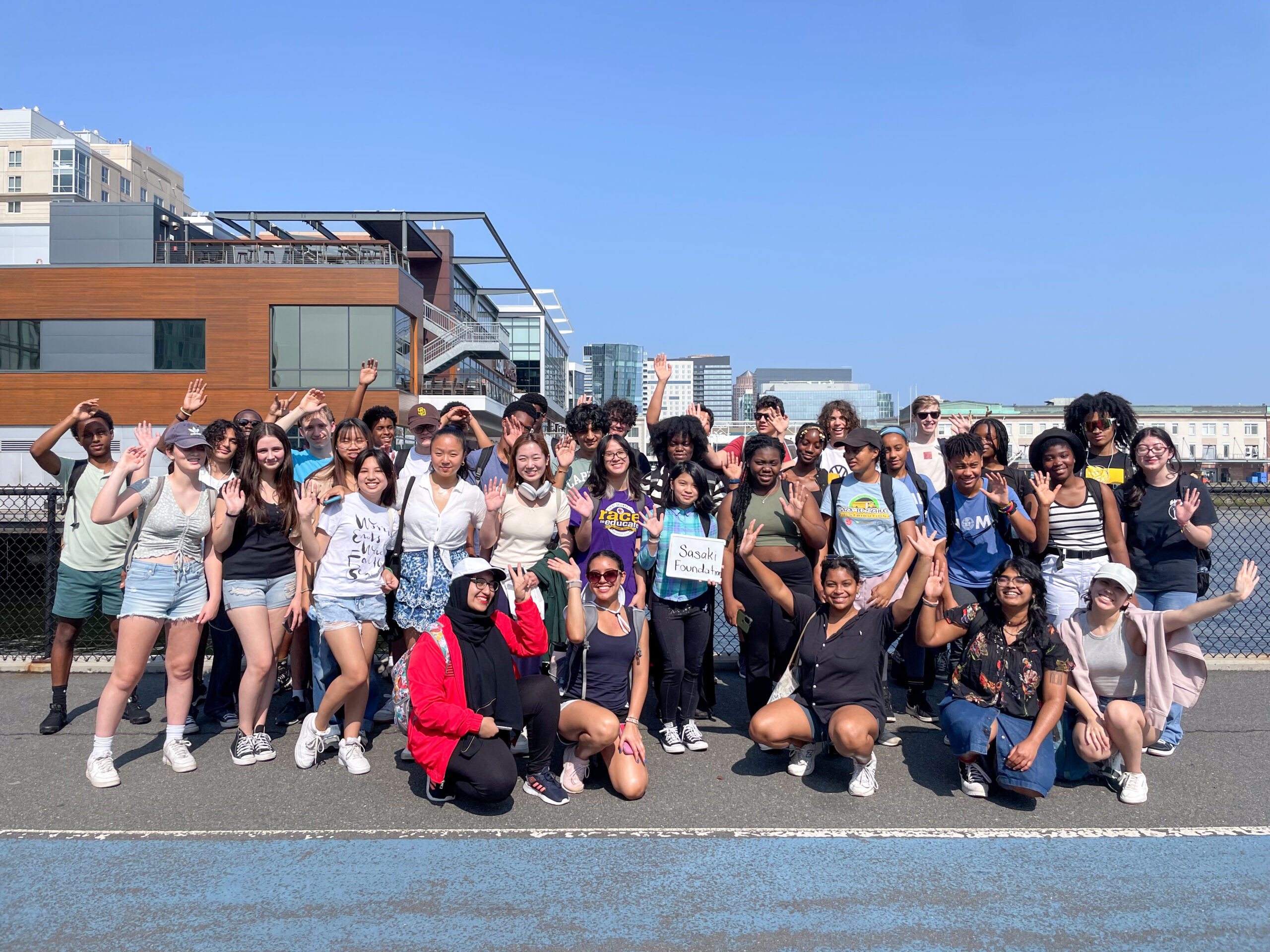
SEED students visited Spectacle Island in Boston Harbor and learned about the island’s history
SEED 2, our more advanced track, allowed students already familiar with design to experience the pressure of a real competition. Both teams were able to produce excellent work. One of the kiosk designs, the Chromapod, attempted to connect 10 World Trade to the natural environment by imitating a native species of octopus. The other design, WeTu, aimed to increase the representation of Indigenous cultures of Massachusetts through a weaving structure. Both designs were impressive and meticulously planned. We were honored to have been part of the first youth-led design competition and to have team Sassafras win with their WeTu design! Their kiosk will be fabricated in the next 18 months.
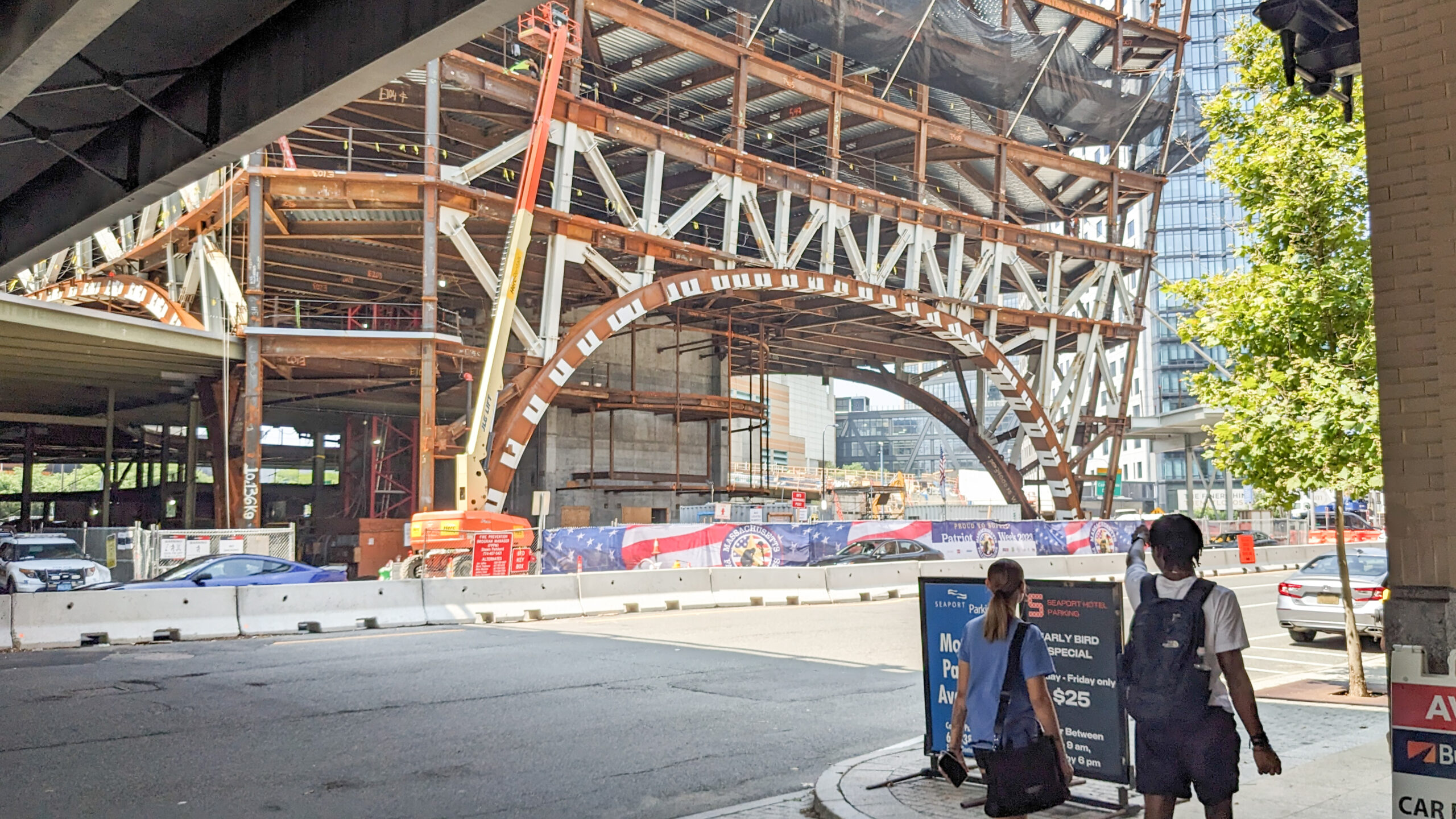
SEED students toured the 10 World Trade site in Boston, MA
As a part of the program, the SEED teaching assistants created workshops that introduced students to the basics of Adobe Illustrator, Photoshop, and InDesign, as well as the 3D modeling program SketchUp. All teams impressed staff and mentors with the level of work they were able to produce in just six weeks; many students took it upon themselves to master their favorite program. This year the Sasaki Foundation also implemented the Commonwealth Corporation’s Signal Success curriculum, which was a great opportunity for personal and professional development. For a lot of students, this internship was their first job and their first chance to start acquiring the soft skills necessary to be successful in the workplace.
This year’s SEED program was an incredible opportunity to see each youth blossom at their own pace. They went from nervous, inexperienced youth to knowledgeable, communicative, and poised speakers. Their final presentations demonstrated just how much young people can excel when given opportunity, support, and resources. The Sasaki Foundation looks forward to staying connected with all these wonderful individuals. Youth development truly is rewarding work; it requires a lot of time, intentionality, and understanding of each student at their current level. The SEED internship is impactful on all who are involved in it. Staff and mentors not only guide students through this experience, but also learn so much about our younger generation, how they think, and what matters to them. Each summer, we are amazed at how much SEED students grow and at what they are able to accomplish, and 2023 was our most impactful yet.
Team Sequoia’s Groundwork Somerville farm design
Nathaniel, Sophia, Yohan, Divine, Robel, and Ava with TA Noushin
Team Ginkgo’s Groundwork Somerville farm design
Eyasu, Malena, Amos, Victor, and Evie with TA Jillian
Team Venus Fly Trap’s Groundwork Somerville farm design
Alexis, Sakina, Matteo, Angela, Naomi, and Eboni with TA Ezekiel
Team Aspen’s Groundwork Somerville farm design
Michelle, Garabed, Violette, Mariah, and Cesar with TA Ruth
Team Cypress’s Groundwork Somerville farm design
Clinton, Egal, Suhaila, Edwarda, and Aubrielle with TA Sabiha
Team Willow’s Groundwork Somerville farm design
Caleb, Amelia, Sidney, Samuel, Yamanuel, and Anna with TA Nisarga
Chromapod, Team Sycamore’s 10 World Trade artist kiosk design
Parmis, Avaugh, Imani, Merina, and Jay with TA Emily
Get a closer look at this summer’s SEED experience on Instagram with our SEED 2023 highlights, and watch the final presentations on YouTube.
The Sasaki Foundation would like to thank this summer’s SEED Staff and Teaching Assistants: Folajimi Bademosi (youth manager), Emily Menard (senior teaching assistant), Ezekiel Lucas, Sabiha Miahjee (2020 SEED alum), Noushin Nawal, Nisarga Ramesh, Ruth Saenz, and Jillian Ziegler.
The Sasaki Foundation gives a special thanks to all of our design mentors this year. The time and energy they gave to each of our teams was invaluable and impactful. Our students walked away with so much knowledge and so many connections. SEED 1 design mentors were Gidiony Alves, Sophie Bellamare, Diane Athaide, Anirudh Bodempudi, Nick Dyer, Eileen Gainfort, Mario Ghosn, Kongyun He, Catherine Hunley, Seungeun Lee, Yasmin Maura-Orihuela, Jesus Mendoza Gonzalez, Aeshna Prasad, Rinika Prince, Andrew Sell, Hyeji Sheen, Fanke Su, and Chris Winkler. SEED 2 design mentors were Isaac Andrade, Jared Barnett, Naomi Canino, Hannah Gibson, Alexandre Kinney, Mytreyi Metta, Yixin Miao, Emily Parris, Liwei Shen, and Lucca Townsend.
We would also like to recognize the Sasaki principals and additional staff that participated this year. This program is a rich experience thanks to all of your efforts and contributions. Principals who took part in the weekly interviews were principal and landscape architect Andrew Gutterman, ASLA, PLA; associate principal and architect Meredith McCarthy, AIA; CEO James Miner, AICP; principal and urban designer Mary Anne Ocampo; principal, architect, interior designer, and Chair of Architecture and Interior Design Victor Vizgaitis, AIA, LEED AP; and principal, landscape architect, and Chair of Design Culture Tao Zhang, ASLA, PLA, LEED AP ND, SITES AP. Individuals who presented projects and 101 sessions were Sally Ferrell, Helina He, Felicia Jiang, Mia Kania, Alison Nash, Ponnapa Prakkamakul, Jenn Robertson, Tristan Rock, Mary Sullivan, and Debbie Wallis. Thank you also to Mubarak Ware (2022 SEED alum), who presented as a first year design student at the University of Miami.
Finally, thank you to all our funders, partners, and supporting organizations, who made this summer’s program possible.
Funders: MassHire Metro North Workforce Board via Commonwealth Corporation, City of Boston Office of Youth Employment & Opportunity, Boston Global Investors, Sasaki, and LeMessurier
Partners: Sasaki, Artists For Humanity, Isenberg Projects, and Groundwork Somerville
Supporting Organizations: Boston Planning & Development Agency, Boston Society for Architecture, Boynton Yards, City of Somerville, DREAM Collaborative, Greentown Labs, MASS Design Group, Reclaim Roxbury, Save the Harbor/Save the Bay, and USQ

